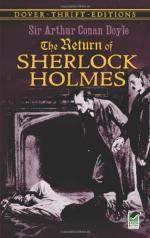Sherlock Holmes was a past-master in the art of putting a humble witness at his ease, and very soon, in the privacy of Godfrey Staunton’s abandoned room, he had extracted all that the porter had to tell. The visitor of the night before was not a gentleman, neither was he a workingman. He was simply what the porter described as a “medium-looking chap,” a man of fifty, beard grizzled, pale face, quietly dressed. He seemed himself to be agitated. The porter had observed his hand trembling when he had held out the note. Godfrey Staunton had crammed the note into his pocket. Staunton had not shaken hands with the man in the hall. They had exchanged a few sentences, of which the porter had only distinguished the one word “time.” Then they had hurried off in the manner described. It was just half-past ten by the hall clock.
“Let me see,” said Holmes, seating himself on Staunton’s bed. “You are the day porter, are you not?”
“Yes, sir, I go off duty at eleven.”
“The night porter saw nothing, I suppose?”
“No, sir, one theatre party came in late. No one else.”
“Were you on duty all day yesterday?”
“Yes, sir.”
“Did you take any messages to Mr. Staunton?”
“Yes, sir, one telegram.”
“Ah! that’s interesting. What o’clock was this?”
“About six.”
“Where was Mr. Staunton when he received it?”
“Here in his room.”
“Were you present when he opened it?”
“Yes, sir, I waited to see if there was an answer.”
“Well, was there?”
“Yes, sir, he wrote an answer.”
“Did you take it?”
“No, he took it himself.”
“But he wrote it in your presence.”
“Yes, sir. I was standing by the door, and he with his back turned at that table. When he had written it, he said: ’All right, porter, I will take this myself.’”
“What did he write it with?”
“A pen, sir.”
“Was the telegraphic form one of these on the table?”
“Yes, sir, it was the top one.”
Holmes rose. Taking the forms, he carried them over to the window and carefully examined that which was uppermost.
“It is a pity he did not write in pencil,” said he, throwing them down again with a shrug of disappointment. “As you have no doubt frequently observed, Watson, the impression usually goes through—a fact which has dissolved many a happy marriage. However, I can find no trace here. I rejoice, however, to perceive that he wrote with a broad-pointed quill pen, and I can hardly doubt that we will find some impression upon this blotting-pad. Ah, yes, surely this is the very thing!”
He tore off a strip of the blotting-paper and turned towards us the following hieroglyphic:
GRAPHIC
Cyril Overton was much excited. “Hold it to the glass!” he cried.




